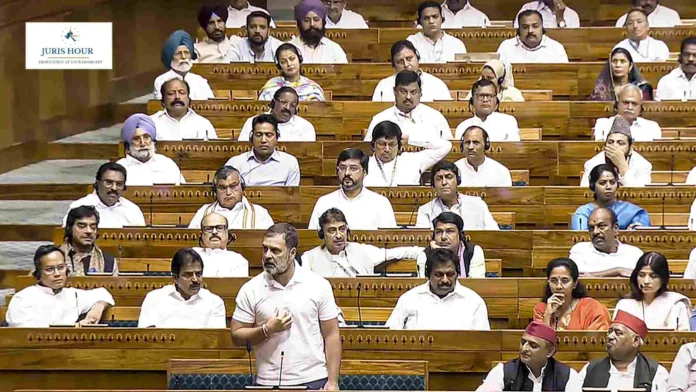The Centre has introduced the Constitution (One Hundred and Thirtieth Amendment) Bill, 2025. It says a Prime Minister, Chief Minister, or any Union/State minister must vacate office if they are arrested and kept in custody for 30 consecutive days for an offence punishable with at least five years’ imprisonment. The Bill was introduced in Lok Sabha on August 20, 2025 and sent to a Joint Parliamentary Committee (JPC) for scrutiny; two allied Bills extend similar rules to Union Territories. It is not law yet.
What exactly does the Bill change?
Today’s position (status quo)
The Constitution has no explicit rule that bars a PM/CM/minister from holding office while in jail. Ministers serve at the pleasure of the President/Governor, effectively on the advice of the PM/CM. Automatic disqualification generally kicks in only on conviction (e.g., under the Representation of the People Act after the Lily Thomasruling).
What does the Bill propose?
30-day custody trigger: If a minister is arrested and detained for 30 straight days for an offence carrying 5+ years’ maximum punishment, removal is triggered.
Mechanism for Union/States:
- A Union minister must be removed by the President on the PM’s advice by Day 31; if the PM doesn’t advise, the minister automatically ceases to hold office the next day.
- A State minister is similarly removed by the Governor on the CM’s advice; failure to advise leads to automatic cessation.
If the person detained is the PM/CM: They must resign by Day 31; if they don’t, they automatically cease to hold office from the next day.
Reappointment allowed: Once released on bail or acquitted, the person can be re-appointed.
Coverage: The amendment modifies Articles 75 (Union), 164 (States) and 239AA (Delhi); allied Bills extend the rule to Puducherry and Jammu & Kashmir.
Quick reference: What’s new vs current law
| Issue | Current framework | 130th Amendment Bill |
| Holding office while in jail (no conviction) | No explicit bar; depends on political advice/pressure | Bar after 30 days’ continuous custody for offences punishable with ≥5 years |
| Who initiates removal? | President/Governor acts on PM/CM advice; no time-bound duty | Mandatory advice by Day 31, else automatic cessation next day |
| If PM/CM is detained | No automatic rule | Must resign by Day 31 or ceases automatically |
| After release/bail | N/A | Reappointment permitted |
| Where it applies | Union & States under general constitutional norms | Articles 75, 164, 239AA; plus UT-specific Billsfor Puducherry, J&K |
How is this different from disqualification under election law?
- Under Lily Thomas (2013), an MP/MLA is disqualified upon conviction with a sentence of two years or more—that’s about membership of the House, not ministerial office, and it acts after conviction, not merely upon arrest/detention. The new Bill creates a separate constitutional rule for holding executive office, kicking in after 30 days’ custody, even before trial ends.
- The Supreme Court in Manoj Narula (2014) urged PMs/CMs not to appoint “tainted” persons as ministers but stopped short of imposing a legal bar. The Bill would convert that moral caution into a binding constitutional rule with a specific timetable.
Will it need ratification by half the States?
Most analyses suggest state ratification is likely not required here because the Bill amends Articles 75, 164 and 239AA, which are not among the provisions listed in the Article 368(2) proviso that trigger state ratification (e.g., Articles 73/162 on extent of executive power, judiciary chapters, 7th Schedule Lists, etc.). However, expect debate on whether the change implicates the federal structure/basic-structure doctrine.
The politics so far
- Introduced & sent to JPC: Tabled August 20, 2025 amid opposition protests; referred to a Joint Parliamentary Committee. The TMC has called the JPC a “farce” and said it will not nominate members.
- Government’s pitch: Home Minister Amit Shah frames it as a test of constitutional morality—“can a PM/CM run the government from jail?”—and says critics are overreacting. PM Modi has publicly backed the thrust, saying there would be “no exceptions” even for him.
- Opposition’s critique: Parties call it unconstitutional, prone to misuse to topple governments, and a threat to federalism. Some leaders allege it’s designed to unseat opposition CMs/ministers within a month of arrest.
- Numbers test ahead: As a Constitution amendment, it needs a special majority in both Houses (and then Presidential assent). With a contentious JPC process and razor-edge Rajya Sabha math, passage is not guaranteed.
Key concerns & likely litigation
- Presumption of innocence vs governance stability: Critics say pre-trial custody can result from an arrest that’s later found unjustified; yet the person would already have lost office. Supporters counter that occupying the top executive chair while in jail erodes public trust.
- Scope for misuse: The 30-day threshold, opponents argue, could be weaponised—extended custody through investigative tactics might engineer removals.
- Federalism: By hard-wiring removal rules into Articles 164 and 239AA, the Union may be seen as re-shaping state executive arrangements—raising basic-structure challenges.
- Reappointment clause: Allowing immediate reappointment after bail could lead to yo-yo governments (out on Day 31, back on bail)—supporters say voters can judge such outcomes.
What happens next?
The JPC will take evidence, suggest changes, and report back. Only after that can the Houses take it up for final passage. Even if cleared, expect Supreme Court review on basic-structure and federalism grounds. Meanwhile, two UT Bills will move on their own tracks.
If enacted, the 130th Amendment would create India’s first explicit constitutional bar on top executive office based on prolonged pre-trial custody, not conviction—shifting a long-running moral debate into hard law. Whether that strengthens constitutional morality or opens the door to political misuse will be the fight to watch—in Parliament, and almost certainly, in court.
Read More: GST ITC Fraud Appeal: Delhi High Court Clears Confusion on Notice & Service Rules

